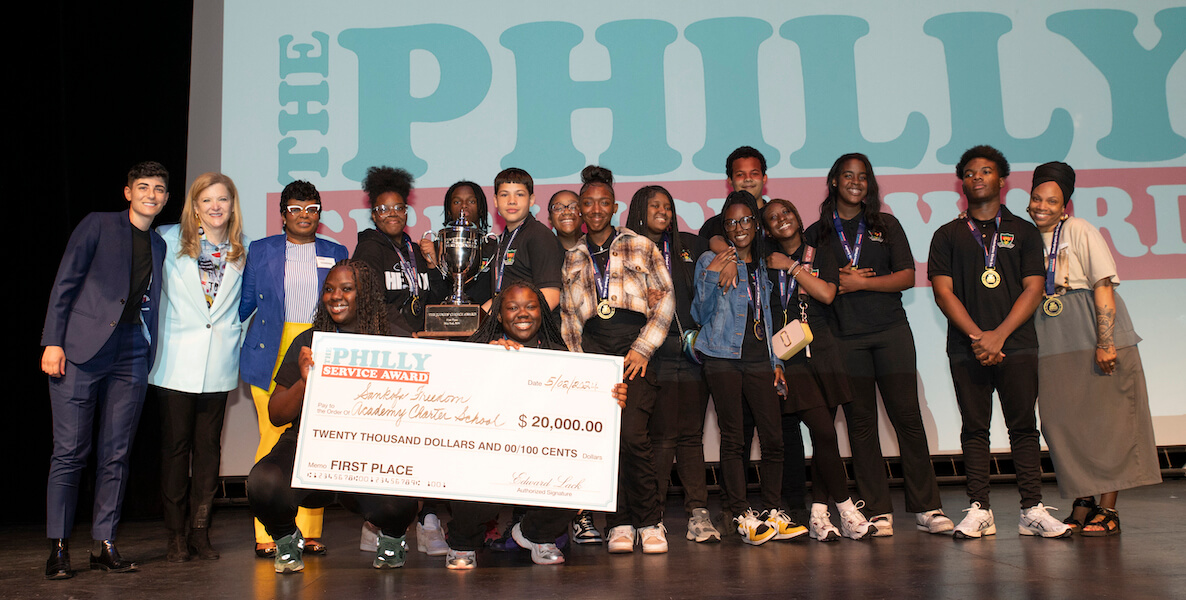Shelly Fisher, the founder of the Philly Service Award, doesn’t like to say that the program she launched last school year “empowers students.”
“We know that students have incredible ingenuity, expertise and power,” Fisher says. “They just need someone to support them.”
That’s just what Fisher was determined to accomplish when she developed the idea of the Philly Service Award — a competition among high school students in Philadelphia who receive grant funding to develop and implement service projects that improve the city.
Through Fisher’s experience creating the Herb it Forward Scholarship Foundation, she realized that the key to success rested in supporting kids with big ideas and creative insights — many of whom felt like “no one else in my high school thinks this way.” Named after her late father, the foundation honors Herb Lotman, a local food-industry entrepreneur and philanthropist who founded Keystone Foods. Herb it Forward awards about $160,000 annually to over 30 Philadelphia students, while also encouraging these scholars to build community through annual leadership camps and volunteer opportunities, says Fisher.
Proactively funding the ambitions of teenagers is far from a guarantee to succeed. But if Fisher has found one secret, it’s that “connecting people, and letting them shine” is a mantra that works.
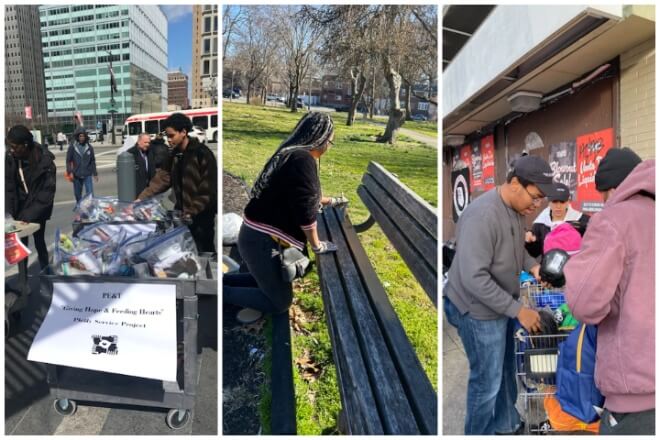
From Idea to Reality
Before reaching out to every high school in the city, Fisher assembled a team who could make the Philly Service Award a reality. In addition to a Board of Directors chaired by Parkway Corporation President and CEO Robert Zuritsky, she enlisted the leadership of Herb it Forward Foundation Executive Director Jen Jones and Treasurer Ed Lack, who served as directors.
Another component of the leadership team was the competition’s Young Adult Advisory Board, made up of local voices. These were civically-minded young adults who are only a few years older than the kids in the initiative. The group served to keep the needs and perspectives of the high school students in mind, and to make field visits with the service projects, lending a hand with whatever the students might need.
The advisory board is a product of what Fisher sees as one of the main principles when it comes to community service: “If you’re going to make a change, make sure you ask the people the change is being made for, so that you’re sure that’s what they want.”
With those supports in place, the team contacted every single public, private and charter high school with a Philadelphia zip code, asking for ideas for student-led service projects. Once projects were approved and given $1,000 each in funding, teachers from participating schools were then eligible for additional money to fund their choice of classroom supplies. After five months, a panel of nonprofit judges reviewed completed projects and handed out a half-dozen awards.
At first, Fisher wasn’t sure how teachers would respond to an external group coming in and asking them to take on another project, with more responsibility. But according to Fisher, the team was “shocked” by how much response the program got in just one year. Over 1,000 students —representing over half of all Philadelphia high schools — completed 86 service projects, with the support of 65 educators. Of the participating schools, 32 were public district schools, 13 were public charter schools, and 17 were private schools.
“We found the district was very supportive, and the teachers gravitated towards [The Philly Service Award]. I think they felt like this is really different and exciting,” Fisher says.
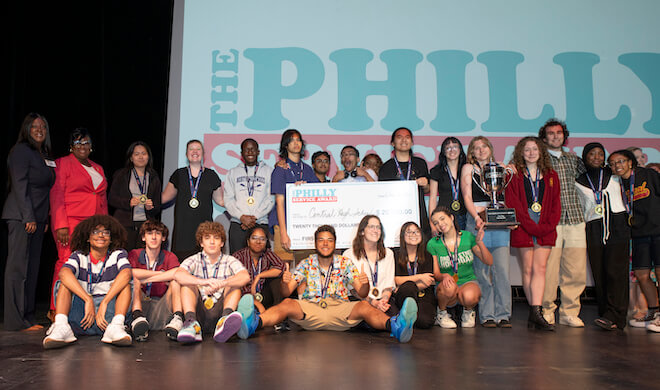
Pulling from the community
From November through March, students were hard at work putting their plans into action. Then, on May 2, students, teachers and community nonprofit leaders gathered at an in-person ceremony to award the winning projects.
According to Loree D. Jones-Brown, CEO of Philabundance and one of the judges for the Philly Service Project, the participating students had a strong grasp of the needs of their communities, “We’ve seen food insecurity increase in our city and in our region, dramatically,” she says. “Young people are thinking, Food insecurity is a problem in my community, and I’m gonna address it.” Other projects focused on issues ranging from gun violence to public health.
Community leaders from all over the city were eager to get involved in the competition: Mayor Cherelle Parker hosted the winners for a meet-and-greet inside the Mayor’s Reception Room. Nine nonprofit leaders, including Mural Arts Philadelphia’s Jane Golden and The Philadelphia Foundation’s Pedro Ramos — served as judges to determine which projects would win the $20,000 gifts attached to the six program-ending Impact Awards, in different categories. (There was an additional Drexel Impact Idea Award — sponsored by Drexel University — for a winning student to receive another $1,000 for themselves and $1,000 for their school.) Winning students and their faculty representatives who won were expected to jointly determine what the funding was used for.
Some of Fisher’s favorite projects included one from Kensington Health Sciences Academy, which built a community library from scratch, which now includes 400 books and an online catalog. Currently, the students who created the library are trying to set up a speaker series with the additional funding from their Young Entrepreneurs Award.
Another nearby school, the Kensington Creative Performing Arts, partnered with the Lutheran Settlement house to film interviews with senior citizens featuring stories about their lives and the historical events they lived through. In addition to the interviews, students did makeovers of the seniors, photographed them, and used all of the components to create an exhibit in March. They won The Community Partner Award for the project.
“Watching some of these seniors feel like, you know, their life’s been valued, respected, documented and now celebrated, it was really, really impressive,” Fisher says.
For Jones-Brown, the judging process felt interpersonal — judges were presented with written briefs and also videos from the participants, and at the awards ceremony, she recognized many of the kids and projects she’d watched. One aspect of the organization that she particularly appreciated was that the groups took different shapes. While many projects were put in place by service clubs and classes, the flexibility of the Philly Service Award meant that schools without these resources in place could still participate.
“I’m particularly impressed that young people are identifying these problems, coming up with solutions, and then acting on them,” Jones-Brown says.
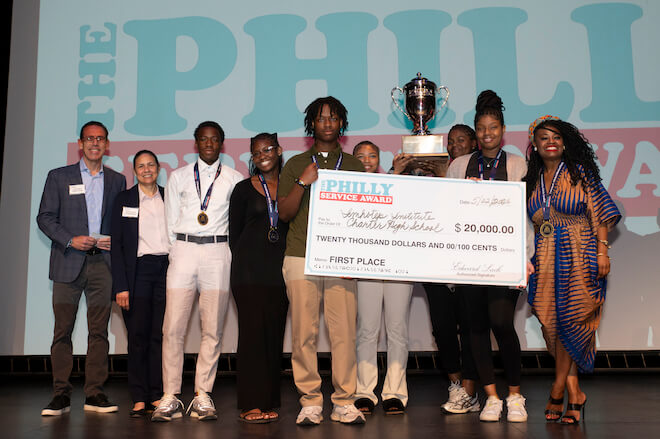
Opportunities for all ages
The Philly Service Award is already gearing up for its second year, with applications opening right after Labor Day, and closing on Nov 1.
They’re adding a new element to this next cycle: a pilot competition consisting of three to five middle schools, who will be given the same funding opportunities as the participating high schools. Fisher envisions the project will continue to scale up and, over time, involve kids of all ages. Part of what makes the Philly Service Award work, according to Fisher, is that the more that young people’s service projects and accomplishments are recognized and shared, the more people will be inspired to take action with projects of their own.
“There’s a lot of negative narratives in the press about young people, right? But the reality is, it’s amazing the things that young people can do,” Fisher says. “The more people can share if they see kids doing something, and recognize them in their high schools, their neighborhoods … I think it really helps.”
At the end of the project, 98 percent of the students involved said they were motivated to participate in further service projects, according to Fisher.
At a time when Philadelphia public schools are struggling to retain teachers and funding, Fisher believes that service projects can play a bigger role in kids’ lives, helping them “imagine a bigger future for themselves in being a change agent for their city.”
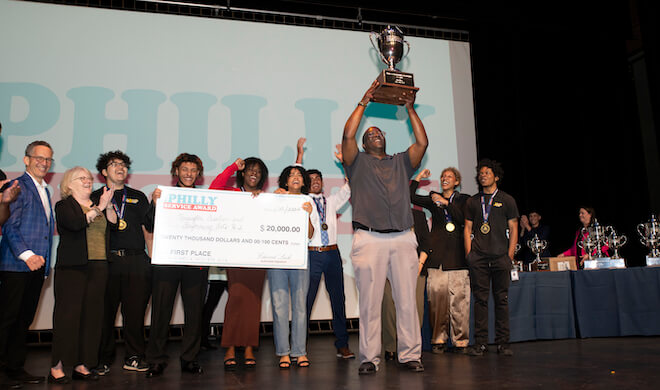
Here are the winners of last year’s Service Awards:
2024 Impact Awards – 1st Place Winners ($20,000 award)
- Young Entrepreneur Award:
- Kensington Health Sciences Academy — their “DreamEscape Library” brought 400 books to Kensington students through a mobile library cart.
- Legacy Builders Award:
- Imhotep Institute Charter High School — “Project Heshima” is boosting recycling rates and turning plastic waste into sustainable solutions.
- Judges’ Choice Award:
- Sankofa Freedom Academy — their “Philly Literacy Mentor Project” trains 8th and 9th graders to become reading mentors to early-elementary students.
- Safer Philly Award:
- The Multicultural Academy Charter School — their project, “MACS Community Service Club – Revitalizing Nicetown, North Philly,” is an effort to build a community garden and free library within the neighborhood.
- People’s Choice Award:
- Central High School — the “Revitalizing with Green” program is dedicated to converting hazardous and vacant lots into community gardens, while addressing food insecurity.
- Community Partner Award:
- Kensington Creative and Performing Arts High School — “The Beauty of Time” is a project in collaboration with Lutheran Settlement House, where students spend three months documenting the lives of seniors in multimedia form.
Second Place winners ($5,000 awards):
- Abraham Lincoln High School; West Catholic Preparatory High School; Boys’ Latin of Philadelphia High School; Sophia Academy.
3rd Place winners ($1,000 awards):
- George Washington High School; Vocation Career Prep High School; Lankenau Environmental Science High School; South Philadelphia High School.
![]() MORE ON UPLIFTING PHILLY YOUTH
MORE ON UPLIFTING PHILLY YOUTH



